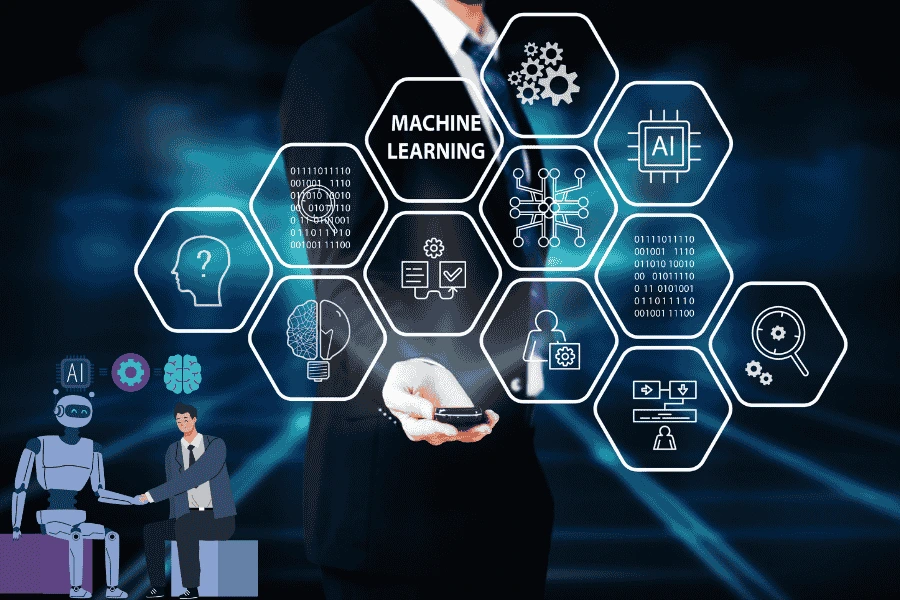AI-Driven RPA: Enhancing Automation with Machine Learning
In today’s fast-paced digital landscape, businesses are under increasing pressure to operate with greater efficiency, accuracy, and speed. Enter AI-driven Robotic Process Automation (RPA) — a transformative combination of artificial intelligence (AI) and automation that’s revolutionizing how companies manage routine operations.But traditional RPA can only go so far. It struggles with unstructured data, dynamic decision-making, and adapting to new situations. That’s where AI-driven RPA comes in — blending Robotic Process Automation with Machine Learning (ML), Artificial Intelligence (AI), and Natural Language Processing (NLP) to create smarter, more flexible automation solutions.

What is AI-Driven RPA?
At its core, Robotic Process Automation (RPA) involves software bots that mimic human actions to perform repetitive, rule-based tasks—such as data entry, invoice processing, or customer onboarding. When AI and machine learning are integrated into RPA, the automation becomes intelligent.hey don't just automate simple workflows; they manage end-to-end processes that involve structured, semi-structured, and even unstructured data.By combining technologies like machine learning models, natural language understanding, and computer vision, businesses can automate far more tasks — and do so with much greater accuracy and resilience.
The Role of Machine Learning in RP
AI-driven RPA plays a transformative role in modern business operations by bridging the gap between rule-based automation and intelligent decision-making. While traditional RPA handles repetitive, structured tasks, AI-driven RPA enables organizations to automate complex processes involving unstructured data, human language, and dynamic workflows. It empowers bots to understand context, make decisions, learn from new inputs, and continuously improve over time. This evolution shifts automation from a tactical cost-saving tool to a strategic enabler of agility, innovation, and digital transformation. By adopting AI-enhanced RPA, companies not only boost operational efficiency but also gain a competitive edge through smarter, more adaptive systems that scale with the needs of the business.
Benefits of AI-Driven RPA
Improved Accuracy
AI bots reduce human errors by learning from data and improving over time. This ensures higher-quality output across processes.
Enhanced Scalability
With machine learning models in place, businesses can scale automation to more complex processes without increasing overhead.
Faster Decision-Making
AI allows bots to make context-based decisions in real time, improving workflow speed and responsiveness.
Cost Savings
Automating intelligent tasks can significantly reduce labor costs and free up employees for higher-value work.
Better Customer Experience
Faster, more accurate responses and services lead to increased customer satisfaction and loyalty.
The Future of Automation is Intelligent
AI-driven RPA is not just a tech upgrade it’s a strategic advantage. As machine learning models become more sophisticated, the future of automation is heading toward self-learning systems capable of proactive, autonomous decision-making.
Businesses that adopt intelligent automation early are likely to see increased agility, reduced costs, and a significant edge in competitive markets.Organizations that invest early in intelligent automation will position themselves as leaders more agile, more customer-centric, and more innovative.Rather than simply "doing things faster," AI-driven RPA enables companies to do things better and smarter setting a foundation for long-term digital transformation and success.
Conclusion
AI-driven RPA represents the next frontier in business automation. By combining the rule-based efficiency of traditional RPA with the adaptability and intelligence of machine learning, organizations can unlock new levels of performance, accuracy, and scalability.Whether you're aiming to streamline internal operations, enhance customer service, or stay competitive in a rapidly evolving market, intelligent automation can be a powerful catalyst for growth.Businesses that embrace this new wave of intelligent automation will unlock unprecedented efficiency, enhance customer experiences, and gain a powerful edge in an increasingly competitive marketplace. Now is the time to embrace the future because in the age of AI, smart businesses automate smarter.
- As e-commerce continues to evolve, leveraging these technologies will be essential for staying competitive and meeting the ever-changing demands of customers.Learn more about Data Analytics, RPA, Python, and subjects related to Data Science from the top 1% of instructors in the industry.
- Data Science and Data Analyst BootCamps. Learn more from the top 1% of instructors in the industry.
Active Events
Laying the Groundwork: Python Programming and Data Analytics Fundamentals
Date: Aug 06, 2025 | 7:00 PM(IST)
7:00 PM(IST) - 8:00 PM(IST)
2811 people have registered
Your Data Science Career Game-Changing in 2024: Explore Trends and Opportunities
Date: Aug 08, 2025 | 7:00 PM (IST)
7:00 PM (IST) - 8:10 PM (IST)
2811 people have registered
From Insights to Impact: Proven B2B Marketing Strategies for Scalable Success
Date: Aug 08, 2025 | 7:00 PM(IST)
7:00 PM(IST) - 8:10 PM(IST)
2811 people have registered
Bootcamps
Full Stack Software Development Bootcamp
- Duration:8 weeks
- Start Date:October 5, 2024
Data Science Bootcamp
- Duration:8 weeks
- Start Date:October 5, 2024
